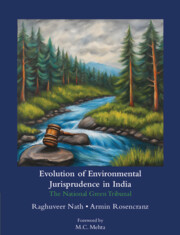Book contents
- Frontmatter
- Dedication
- Contents
- List of Images
- Foreword
- Preface
- Acknowledgements
- List of Abbreviations
- 1 Introduction to the National Green Tribunal: The Need for a “Green Court”
- 2 The National Green Tribunal Act, 2010: Analysis and Interpretation
- 3 Interpretation and Application of Environmental Principles
- 4 Evaluating the National Green Tribunal after a Decade: Challenges to Overcome
- Interview with Justice Swatanter Kumar
- Interview with Vimal Bhai
- Index of Cases
3 - Interpretation and Application of Environmental Principles
Published online by Cambridge University Press: 15 January 2025
- Frontmatter
- Dedication
- Contents
- List of Images
- Foreword
- Preface
- Acknowledgements
- List of Abbreviations
- 1 Introduction to the National Green Tribunal: The Need for a “Green Court”
- 2 The National Green Tribunal Act, 2010: Analysis and Interpretation
- 3 Interpretation and Application of Environmental Principles
- 4 Evaluating the National Green Tribunal after a Decade: Challenges to Overcome
- Interview with Justice Swatanter Kumar
- Interview with Vimal Bhai
- Index of Cases
Summary
Article 51 of the Indian Constitution states that the state shall foster respect for international law and treaty obligations. To give effect to this provision, Article 253 of the Constitution empowers the parliament to make any law for implementing obligations under international treaties, conferences, or agreements. In particular, the preamble to the NGT Act states that the creation of the NGT symbolizes the fulfilment of India's obligations under the United Nations Conferences on the Human Environment (Stockholm, 1972) and Environment and Development (Rio de Janeiro, 1992). These conferences call upon member states to, inter alia, provide effective access to judicial and administrative proceedings and to develop national laws regarding liability and compensation for victims of environmental pollution and damage.
While there are several internationally recognized norms and principles, three main principles form the bedrock of environmental jurisprudence in the Indian context. These three principles are sustainable development, the precautionary principle, and the polluter pays principle. While these have been extensively used by the Supreme Court in several important environmental cases, the NGT Act is the first legislation that codifies these principles. Section 20 of the NGT Act states:
The Tribunal shall, while passing any order or decision or award, apply the principles of sustainable development, the precautionary principle and the polluter pays principle.
Overall, the NGT Act accords significant discretion to the Tribunal in relation to how it should adjudicate and award compensation. Given this context, Section 20 assumes greater significance as it is the only guiding provision contained in the NGT Act, which provides directions with respect to how the Tribunal should pass an order or award. The use of the word “shall” indicates that it is a mandatory provision and that the NGT is obligated to base its decision on these three principles, if they are applicable.
Accordingly, these principles have formed an integral part of most decisions of the NGT and are intricately linked with its jurisprudence. As we will discuss, most landmark cases of the NGT have relied on these principles to provide environmental justice. Through this chapter, we explore the significance of these three principles. In doing so, we highlight their origin and evolution in the international context, their interpretation and application by the Supreme Court of India, and their use by the NGT.
- Type
- Chapter
- Information
- Evolution of Environmental Jurisprudence in IndiaThe National Green Tribunal, pp. 199 - 361Publisher: Cambridge University PressPrint publication year: 2025

